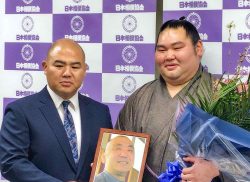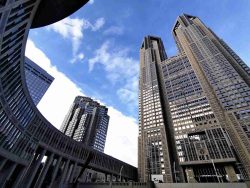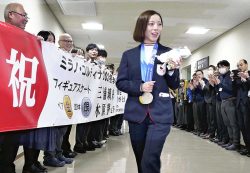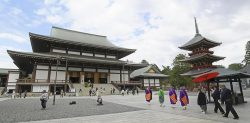13:10 JST, February 21, 2021
This incident deals a serious blow to the trade in artwork. The entire industry involved in the distribution of artwork needs to resolve the confusion and establish a system to allow artwork to be bought and sold with peace of mind.
It has come to light that a large number of counterfeit prints based on paintings by famous Japanese artists have been circulated in the nation. An investigation led by the Contemporary Graphic Art Dealers Association of Japan has confirmed that 16 artworks, mainly by the three late artists Ikuo Hirayama, Kaii Higashiyama and Toshio Arimoto, were illicitly copied.
An art dealer in the Kansai region admitted to investigators that they asked a special workshop to produce copies and had sold them since about eight years ago. The owner of the workshop told The Yomiuri Shimbun, “I had no money, so I readily accepted the request.”
These acts must be criticized for undermining public trust in the art market. Art dealers are supposed to distribute artwork responsibly. In addition, it is extremely serious that a workshop with a thorough knowledge of technique and other matters was involved.
The workshop owner also said, “I printed 20 pieces each of 40 works.” If this is true, many counterfeit prints exist in addition to those of the 16 works identified so far. The Metropolitan Police Department is investigating the case on suspicion of violations of the Copyright Law. The whole situation, including the identification of illicit prints, should be uncovered as soon as possible.
Department stores sold these prints for prices ranging from several hundreds of thousands of yen to several million yen, and are trying to get them back. The nationwide organization of art dealers said it plans to ask a specialized organization to determine the authenticity of the art. The art industry should trace down the distribution routes and deal with buyers and others sincerely.
To regain public trust, it may be necessary to review industry practices.
For print artwork, the number of prints is determined in advance, and the serial number and the artist’s signature are written on the edges. They are guarantees of an authentic work. There is said to have been little need for appraisals because the original plates are disposed of so they cannot be reused later.
In response to the revelation of counterfeit products that flout the rules, the industry must establish a system under which printed artwork is always appraised. New measures should be taken, such as issuing a document certifying that the work is genuine.
It is also essential for industry groups to take the initiative in disclosing information on wrongdoing and devising measures to prevent a recurrence.
Counterfeiting has long been an unending problem in transactions involving prints and other artwork. Unless the industry groups eliminate the impression that it is difficult for non-experts to access art, they cannot hope that artwork will reach a wide range of people.
Japan’s domestic art market is considered small from a global perspective, and the government in recent years has been studying ways to vitalize the buying and selling of artwork. Transparency is a prerequisite for this. The government must closely monitor the industry’s efforts and help improve its business structure.
— The original Japanese article appeared in The Yomiuri Shimbun on Feb. 21, 2021.
Top Articles in Editorial & Columns
-

Riku-Ryu Pair Wins Gold Medal: Their Strong Bond Leads to Major Comeback Victory
-

Reciprocal Tariffs Ruled Illegal: Judiciary Would Not Tolerate President’s High-Handed Approach
-

China Provoked Takaichi into Risky Move of Dissolving House of Representatives, But It’s a Gamble She Just Might Win
-

Japan’s Plan for Investment in U.S.: Aim for Mutual Development by Ensuring Profitability
-

Flu Cases Surging Again: Infection Can Also Be Prevented by Humidifying Indoor Spaces
JN ACCESS RANKING
-

Producer Behind Pop Group XG Arrested for Cocaine Possession
-

Japan PM Takaichi’s Cabinet Resigns en Masse
-

Man Infected with Measles Reportedly Dined at Restaurant in Tokyo Station
-

Israeli Ambassador to Japan Speaks about Japan’s Role in the Reconstruction of Gaza
-

Videos Plagiarized, Reposted with False Subtitles Claiming ‘Ryukyu Belongs to China’; Anti-China False Information Also Posted in Japan





















